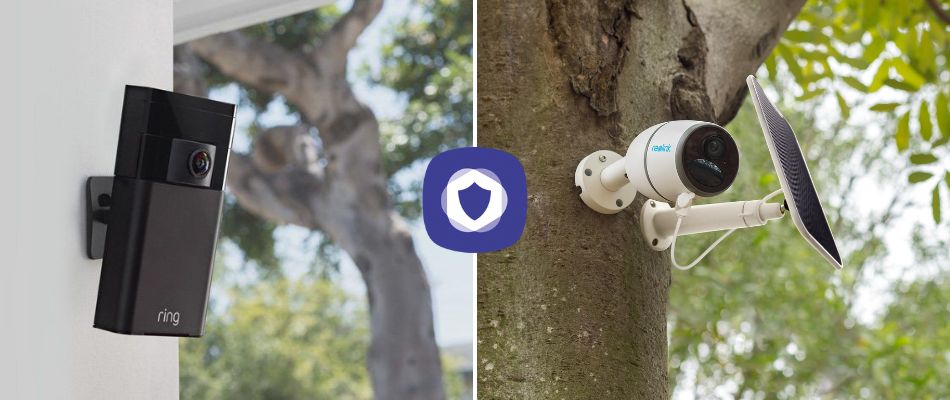Home security cameras are a hot topic today, and there is an abundance of camera systems available. Two great choices are Ring and Reolink.
Ring shot to fame in 2013 with the Ring video doorbell. Its range has expanded since then, now including most of the trappings of a traditional security company. Reolink is also reasonably new to the market, launching in 2009. Reolink specializes in offering great security cameras at an affordable price. Each provider has unique offerings; let's take a look at what they can do for you.
Ring vs Reolink: What do they have in common?
- Weatherproof cameras: Reolink and Ring have weatherproof outdoor security cameras so that you can keep your property safe regardless of the weather.
- Solar panels: The Ring Spotlight cam comes with solar panels, as does the Reolink Argus.
- Video doorbells: You can purchase a doorbell camera.
- Night vision: Ring and Reolink offer color night vision, which is a rare feature for most security cameras.
- Battery life: The battery-powered models have good battery life.
- Motion detection: Ring and Reolink have advanced motion sensors that will notify you via push notifications if they're triggered.
- Camera quality: Ring and Reolink cameras offer 1080p HD video quality.
- Two-way talk: Two-way audio is a convenient feature that will make it seem like you're home even if you're not - you can communicate with a friend, delivery person, or anyone on your doorstep.
Ring vs Reolink: What are the differences?
- Smart home integration: While Alexa integration is 'in the pipeline' for Reolink, they don't offer it yet. Only Ring is compatible with Amazon's Alexa. Reolink is compatible with Google Assistant, though.
- Warranty: Reolink offers a 2-year warranty, but Ring only provides a one-year warranty.
- 4k camera quality: Reolink's 4k Ultra HD PoE Camera offers 4k camera quality.
- Local storage: All Reolink cameras support local storage with a MicroSD card.
- Cloud storage: Reolink offers some free cloud storage without paying a monthly fee, but you'll pay extra if you need more than 1GB.
Ring: What you need to know
Ring launched in 2013 with a video doorbell; they've gone from strength to strength since and can offer you a comprehensive security system, including compatibility with smoke alarms and environmental sensors.
Installation
Installing your new Ring Camera will be a DIY process; how difficult it is varies depending on the system you choose.
Some installations are a simple plug-in and go, but wired installations can be complex, with drilling and hardwiring required. You may need to consult a pro. Amazon, Ring's parent company, may be able to offer you an estimate for this service.
Equipment
Ring offers various equipment types, plus compatibility with Honeywell security products. Equipment you can use with Ring includes:
- Smart locks
- Video doorbells
- Indoor and outdoor cameras
- Panic buttons
- Lighting
The base package includes:
- Base station
- Keypad
- Five contact sensors
- Two motion detectors
- Range extender
Home automation
Ring can be incorporated into an existing smart home system, including smoke alarms, lighting, window sensors, and Ring-compatible equipment. There aren't many third-party integrations, though.
Pricing
- Equipment costs: For an alarm system, you'll pay under $200 for the basic kit, but more expensive kits are available. You can buy an individual camera for $99.
- Monthly fee: You can buy professional monitoring for $100 a year or $10 a month.
Nerd pros
- Cameras: Ring provides outdoor and indoor cameras. Most cameras are weatherproof and have color night vision.
- Professional monitoring option: If you want professional monitoring, you can purchase it for $10 per month.
Nerd cons
- Video storage fees: If you need cloud storage, you'll need to pay for it. Some companies don't charge for this, and even Reolink will offer you a free allowance.
- Monthly fees: Ring charges a higher monthly fee and has more features behind a paywall. Two-way talk is available with most products, but you'll need a subscription to use it.
- Upfront payment: You'll have to pay more upfront as you can't spread the cost with a payment plan.
Reolink - What you need to know
Reolink is a reliable provider that launched in 2009, offering mostly security cameras. They mainly provide batter-powered security cameras, Power over Ethernet (PoE) IP Cameras, Network Video Recorders (NVRs), Wi-Fi security cameras, and PoE Wi-Fi security camera systems. They've revolutionized the industry, releasing the first 100% battery-powered IP camera.
Installation
Installation is DIY only, and depending on the Reolink camera you choose, installation can be as simple as using a QR code. You'll receive motion alerts via the same app you use for setup. However, some cameras will need mounting, but users report an easy process without the need for professional installation. Because these battery-powered cameras are wire-free, you don't need to worry about drilling or hardwiring.
Equipment
Reolink primarily offers cameras, unlike Ring. But the array is extensive, including cameras with rechargeable batteries, PoE cameras, and NVRs. Popular cameras available includes:
- Reolink Argus 2
- Reolink Argus PT
- Reolink E1
Home automation
Most Reolink cameras are compatible with Google Nest and Google Assistant, but there are no other third-party integration opportunities. This isn't the security system for you if you want a highly advanced smart home.
Pricing
Reolink's prices vary; costs start at $70-120 for one camera. There aren't many bundle options. Reolink also offers cloud subscription services at the below prices.
- Basic plan: $0/month; 7 days of video, 1 camera; 1 GB cloud storage
- Standard plan: $3.49/month, 30-day cloud storage, five cameras, 10 GB cloud storage
- Premier plan: $6.99/month, 30-day cloud video history, ten cameras, 40 GB cloud storage
- Business plan: $10.49/month, 60-day cloud video history, 30 cameras, 100 GB cloud storage
Nerd pros
- Pricing: If you're looking for a budget-friendly option, Reolink is an excellent idea. You'll usually pay under $100.
- Simple installation: Most installations have only one step, but even the slightly more complex variations require only a simple mount.
- Power options: Multiple power options are offered, including solar-powered batteries.
Nerd cons
- Lack of smart home options: Reolink doesn't offer much for those who want a smart home ecosystem; Ring provides more.
- No professional monitoring: Reolink doesn't offer professional monitoring, with just motion-activated alerts. You'll need to be confident managing your own security system.
- Limited general capabilities: Our SecurityNerd was disappointed with the lack of standard features like geofencing and person detection. Other cameras, including those offered by Ring, have more features for a similar price.
Ring or Reolink?
Ring and Reolink are reliable providers with good customer service, but Reolink seems a cut above Ring when it comes to more straightforward installation, additional power options, pricing, and extended warranty. But they do miss out on crucial benefits such as smart home options. Ring offers extra benefits, such as compatibility with Honeywell security equipment that will give you a more comprehensive home security system.
This article has been reviewed and approved by Officer Banta.

Officer Banta is the official SecurityNerd home security and safety expert. A member of the Biloxi Police Department for over 24 years, Officer Banta reviews all articles before lending his stamp of approval. Click here for more information on Officer Banta and the rest of our team.

